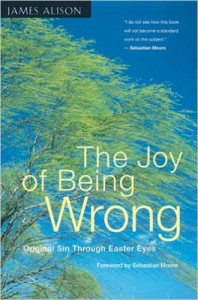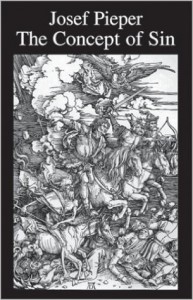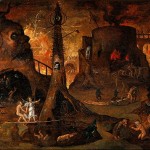 The Joy of Being Wrong: Original Sin Through Easter Eyes, James Alison
The Joy of Being Wrong: Original Sin Through Easter Eyes, James Alison
This pioneering work of theological anthropology looks at original sin in the light of the resurrection, and shows how forgiveness has become the way of transformation. “A summa of sorts—thoroughly original. While remaining faithful to tradition, James Alison is constantly breaking new ground for its understanding and application.” —Andrew J. McKenna, chair of the department of modern languages, Loyola University of Chicago “A terrific book—like everything James Alison does—full of tremendous spiritual and theological insight.” —René Girard, author of Violence and the Sacred
BONUS: AN OLD CLASSIC
 The Concept of Sin, Josef Pieper
The Concept of Sin, Josef Pieper
In ordinary conversation, including among the “educated”, the word “sin” rarely gets mentioned except when one is trying to be coy or facetious. As Thomas Mann once said, “sin” is nowadays “an amusing word used only when one is trying to get a laugh”.
But this small work will interpret sin in its true — that is, serious — meaning. What will emerge from its analysis is the discovery that the concept of sin can still serve to unlock the mystery of existence, at least for a thinking that wants to press down to the very foundations.
Needless to say, such an effort will require a kind of “mining energy” of an archeologist of ideas who knows how to recover what was once known (or at least suspected) from time immemorial but has now been forgotten. But Josef Pieper does more than bring to bear on this issue his famous powers of excavation; he also makes meaningful the concept of sin to the ways of thinking and speaking of our time.
Readers of his work already know Pieper as an extraordinarily fitting master in this art of making “the wisdom of the ages” a living reality today. And in this work he brings Plato, Augustine, and Thomas Aquinas into a living dialogue with T. S. Eliot, Andre Gide, even with Jean-Paul Sartre. As he shows in this powerful work, none of these writers leaves any doubt that the fact of sin is central: It is the willful denial of one’s own life-ground, a denial that alone rightly bears the name of “sin”. Paradoxically, this reality is both willed and yet also pre-given, that is, both adventitious and yet somehow innate to our existence — a paradox which, next to the mystery of existence itself, is the most impenetrable mystery of all.
Other noteworthy books: The Fire and the Rose Are One (Sebastian Moore), Busy Monsters (William Giraldi), The Land of Ulro (Czeslaw Milosz), The Living Thoughts of Soren Kierkegaard (W.H. Auden, ed.).
See also: A True Opium for the People is a Belief in Nothingness After Death
Consider making a donation to this blog through the donation button on the upper right side of its homepage. Frankly, our family is just plain short on cash.
Stay in touch! Like Cosmos the in Lost on Facebook:












